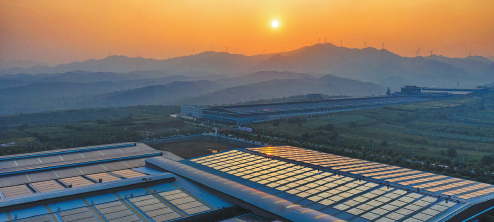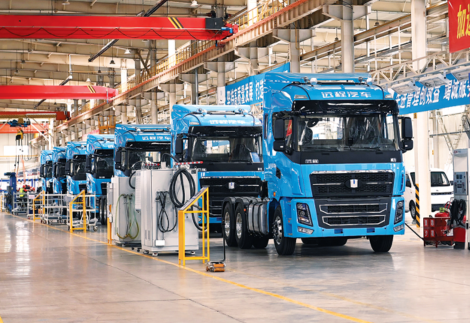Enormous potential as Shanxi embraces new three sectors
Updated: 2024-07-31
Province moves on from heavy industry to invest in EVs, lithium-ion power storage and photovoltaics
The "new three sectors" has been a buzzword among Chinese officials and State media recently, as they highlight the strong performance of photovoltaics, lithium-ion batteries and electric vehicles in driving China's high-quality development and exports. The development of the new three sectors, which promise great potential, was included in the Government Work Report during this year's two sessions of the National People's Congress and the National Committee of the Chinese People's Political Consultative Conference, which were held in Beijing in early March. Compared with the old three sectors of clothes, home appliances and furniture, the new three represent an upgrade of China's manufacturing power and its strength in the global manufacturing landscape. The North China province of Shanxi is also charting news efforts to boost the new three sectors for fostering new quality productive forces and grasping new development opportunities.
In recent years, electric vehicles, lithium-ion batteries and photovoltaics have been sought-after across international markets.
The latest statistics show that China's total exports of the three categories reached 1.06 trillion yuan ($146.28 billion) in 2023, surpassing the 1 trillion yuan bench mark for the first time.
It is worth mentioning that exports of new energy vehicles – mainly EVs – reached more than 1.2 million units in 2023, growing 77.6 percent from 2022.
China is the leading exporter of NEVs, which have accounted for one-third of China's total vehicle exports in recent years.
Officials and experts believe the three strategic emerging sectors will inject vitality into China's sustainable economic development and help foster new quality productive forces in the country. The sectors also reflect China's ability to innovate and its industrial upgrading in advanced, intelligent and green directions.
Shanxi province, which used to be reliant on coal mining and other related heavy industries, is implementing a transformation campaign to diversify and strengthen its economy by cultivating emerging industries and upgrading traditional sectors.
The booming development of the new three sectors is a crucial part of this economic transformation and is creating opportunities for local business development.
Over recent years, Shanxi has formed complete industry chains for the manufacture of NEVs, photovoltaics and lithium-ion batteries.
These industry chains in Shanxi are represented by leading manufacturers of national and international repute.
Geely Automobile, for instance, operates an NEV manufacturing base in the central Shanxi city of Jinzhong, which can produce about 200,000 vehicles annually. This is a comprehensive facility for electric, methanol-fueled and other vehicles.
Photovoltaic manufacturers in Shanxi reported 20 billion yuan in combined business revenue in 2023. Jinergy – a subsidiary of Shanxi's renowned energy company, Jinneng Holding – is one of the leading photovoltaic component producers in Shanxi. Its products are exported to dozens of countries that include Japan, South Korea and Australia.
Experts and industry insiders said that the development of the new three sectors can play a crucial role in Shanxi's economic transformation and energy revolution campaign, helping to drive low-carbon and sustainable development in the province.
They added that the companies' focus on digitalization and smart operations can help to improve Shanxi's overall innovation.
When talking about the photovoltaic sector, Yang Liyou, general manager of Jinergy, said: "The industry is technology-intensive. The key to our development lies in continuous and comprehensive innovation."
He said that the use of intelligent production and flexible manufacturing allows the company to achieve better efficiency and provide customers with optimized solutions.
For instance, the company's advanced manufacturing plant uses intelligent equipment and multisystem platforms to produce high-efficiency solar cells. Artificial intelligence is also used to ensure precise online control, achieve system automation, digitalization and intelligent coordination.
Liu Jie and Chen Lifang contributed to this story.

With photovoltaic panels installed on its rooftops, a company in Yuanqu county supplies clean power to local grids. XUE JUN/FOR CHINA DAILY

Methanol-powered heavy-duty trucks roll off the production line at Shanxi New Energy Automotive Industry. SHI XIAOBO/FOR CHINA DAILY



